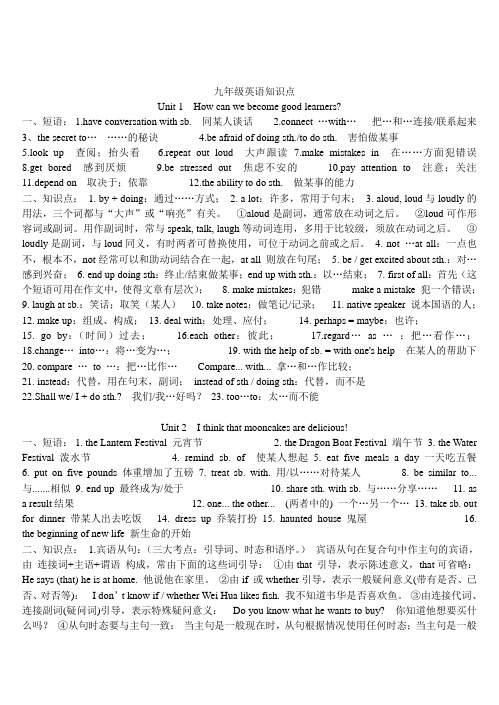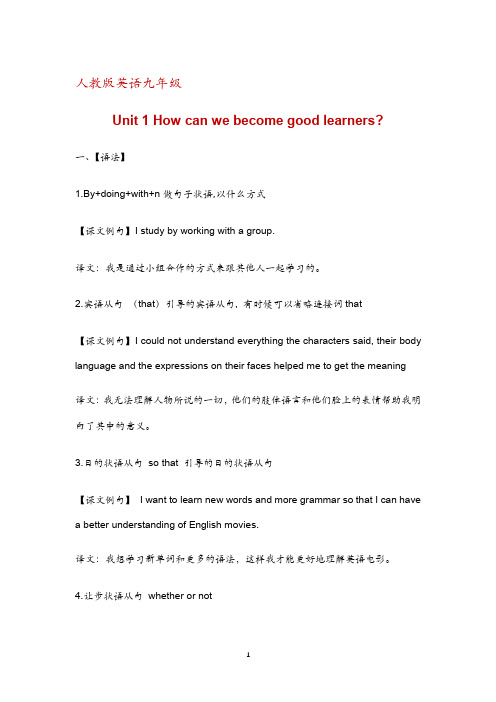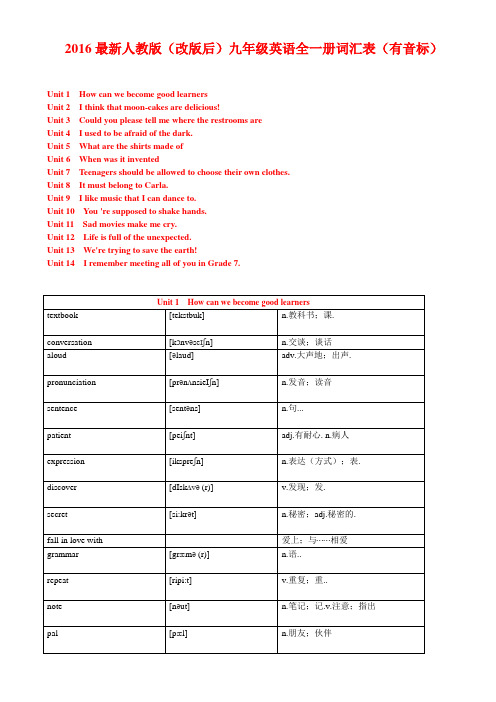2016九年级英语全册 Unit 1 How can we become good learners
九年级英语全册Unit1Howcanwebecomegoodlearners典型例题(带答案)

九年级英语全册Unit1Howcanwebecomegoodlearners典型例题单选题1、Developing good reading habits can ___________ our reading speed. A.reviewB.receiveC.spreadD.increase答案:D句意:培养好的阅读习惯可以提高我们的阅读速度。
考查动词辨析。
review回顾;receive收到;spread传播;increase提高。
根据Developing good reading habits及our reading speed,可知,培养好的阅读习惯可以提高阅读速度,所以空格处填increase。
故选D。
2、I learn English ________ practicing conversations with friends.A.onB.byC.inD.of答案:B句意:我通过和朋友们练习对话学习英语。
考查介词词义辨析。
on在……上;by由,凭借,通过;in在……内;of……的。
题干中“practicing conversations with friends”是“I learn English”的方法,因此by符合语境。
故选B。
3、—It’s smoggy these days. That’s terrible!— Yes, I hope to plant trees. ________ trees, _________ air pollution.A.The more; the fewerB.The less; the moreC.The less; the fewerD.The more; the less答案:D句意:——这几天都有大雾。
那太糟糕了!——是的,我希望去植树。
树越多,空气污染越少。
考查形容词的比较级。
根据常识可知,树越多,空气污染则越少。
两个“the+形容词的比较级”表示越……越……。
九年级英语全册各单元知识点总结

九年级英语知识点Unit 1 How can we become good learners?一、短语:1.have conversation with sb. 同某人谈话 2.connect …with…把…和…连接/联系起来3、the secret to………的秘诀 4.be afraid of doing sth./to do sth. 害怕做某事5.look up 查阅;抬头看6.repeat out loud 大声跟读7.make mistakes in 在……方面犯错误8.get bored 感到厌烦9.be stressed out 焦虑不安的10.pay attention to 注意;关注11.depend on 取决于;依靠12.the ability to do sth. 做某事的能力二、知识点: 1. by + doing:通过……方式;2. a lot:许多,常用于句末; 3. aloud, loud与loudly的用法,三个词都与“大声”或“响亮”有关。
①aloud是副词,通常放在动词之后。
②loud可作形容词或副词。
用作副词时,常与speak, talk, laugh等动词连用,多用于比较级,须放在动词之后。
③loudly是副词,与loud同义,有时两者可替换使用,可位于动词之前或之后。
4. not …at all:一点也不,根本不,not经常可以和助动词结合在一起,at all 则放在句尾;5. be / get excited about sth.:对…感到兴奋;6. end up doing sth:终止/结束做某事;end up with sth.:以…结束;7. first of all:首先(这个短语可用在作文中,使得文章有层次);8. make mistakes:犯错make a mistake 犯一个错误;9. laugh at sb.:笑话;取笑(某人)10. take notes:做笔记/记录;11. native speaker 说本国语的人;12. make up:组成、构成;13. deal with:处理、应付;14. perhaps = maybe:也许;15. go by:(时间)过去;16.each other:彼此;17.regard…as …:把…看作…;18.change…into…:将…变为…;19. with the help of sb. = with one's help 在某人的帮助下20. compare …to …:把…比作…Compare... with... 拿…和…作比较;21. instead:代替,用在句末,副词;instead of sth / doing sth:代替,而不是22.Shall we/ I + do sth.? 我们/我…好吗?23. too…to:太…而不能Unit 2 I think that mooncakes are delicious!一、短语:1. the Lantern Festival 元宵节 2. the Dragon Boat Festival 端午节3. the Water Festival 泼水节 4. remind sb. of 使某人想起 5. eat five meals a day 一天吃五餐6. put on five pounds 体重增加了五磅7. treat sb. with. 用/以……对待某人8. be similar to... 与.......相似9. end up 最终成为/处于10. share sth. with sb. 与……分享……11. as a result结果12. one... the other... (两者中的) 一个…另一个…13. take sb. out for dinner 带某人出去吃饭14. dress up 乔装打扮15. haunted house 鬼屋16. the beginning of new life 新生命的开始二、知识点: 1.宾语从句:(三大考点:引导词、时态和语序。
【学海风暴】2016九年级英语全册 Unit 1 How can we become good learners Section B(2a-2e)课件

How can we become
good learners ?
Section B (2a-2e)
Learning target
一、通过学习,能正确写出本课课标词及短语: ability, in common, brain, active, pay attention to, connect…with, get bored, take notes, overnight, look for, review, knowledge, wisely. 二、能熟练说出和写出本话题的功能句: 1. But whether or not you can do this well depends on your learning habits. 2. ...your brain is more active and it is also easier for you to pay attention to it for a long time.
If you are interested in something, your brain is _____________ and it is also ______ more active easier for you to pay attention to it for a long time. Good learners often _______ connect what they need to learn ____ with something they _______________. are interested in
5. What study skills does the writer talk about? Do you have those study skills? Creating an interest in what they learn; Practicing and learning from mistakes; Developing their study skills; Asking questions.
2016九年级英语全册 Unit 1 How can we become good learners

A. a lot B. lot of C. a lot of Dຫໍສະໝຸດ muchHomework
Writing: 假设你在英语听力方面存在问题,积极主
动向老师请教学习方法。编写一个你与老 师之间的对话。
要求:对于表达困难、解决方法和建议的 方式,尽量采用不同句式,不要单一。
Thank you for listening! Goodbye!
2. _I_c_a_n_’_t_p_r_o_n_o_u_n_c_e__so_m__e__w_o_r_d_s_._______ 3. _I_r_e_a_d__v_e_ry__s_lo_w__ly_.__________________ 4. _I_c_a_n_’_t _a_lw__a_y_s_m__a_k_e_c_o_m__p_le_t_e_s_e_n_t_e_n_c_e_s.
A: I always forget the new words. B: You can write the new words in your
notebook and study them at home.
英汉短语互译
1. spoken English
英语口语
2. 犯错;出错
make mistakes
3.He can j_o_i_n_a_n__E_n_g_l_is_h__c_lu_b_ to practice speaking.
4. He should find a __p_e_n__p_a_l_to practice writing.
Group work
小组讨论,记下小组成员 的具体困难及解决办法
____ I can’t spell some English words.
____ I often make mistakes in grammar.
人教版九年级英语Unit-1How-can-we-become-good-learners重点解析.

注意:该句式中的have或has是助动
词,has用于第三人称单数,其它人称
一律用have。
2. 否定句:现在完成时的否定句式是 “haven’t(hasn’t)+过去分词”。 3. 疑问句:现在完成时的一般疑问句式 是把助动词have或has提到主语之前。 回答用Yes, …have (has). /No, …haven’t (hasn’t). 连用时间状语:already, yet, ever, never, just, before, several times 等。
2) by+ 交通工具、交通方式名词 travel by air /land/sea. go by train /boat/ bus 3) by+ 地点名词。表方位,“在……旁边” by the lake/river/window/door
4) by+时间名词。“到……时(已发生某事); 最晚、不迟于……;在……之前”,此时谓语多 用完成时。 By now/ then/ this time/ next Friday/ the end of last year/ three o’clock
3)(指方式、方法)怎样,怎么 How did you solve this question? 你是如何解决这个问题的? How do you get to school? 你是如何去学校的? 4) 用于惊叹句中,表示多么、何等。 How well you look! 你看起来多么健康啊! How I wish to have a long vacation these days! 这些天我多么希望去度一次长假啊!
3、另外, by作为介词的意义有很多, 例如: 1)逐批 one by one 一个接一个 2)沿着,经由 come by the highway 由公路来 3)由于 by mistake 由于差错 4)被,由 some articles written by Lu Xun 一些由鲁迅写的文章 5)表示面积 a room 5m by 4m 一间长五米宽四米的房间 4、固定短语
英语九年级Unit 1 How can we become good learners重难点知识

人教版英语九年级Unit 1 How can we become good learners?一、【语法】1.By+doing+with+n做句子状语,以什么方式【课文例句】I study by working with a group.译文:我是通过小组合作的方式来跟其他人一起学习的。
2.宾语从句(that)引导的宾语从句, 有时候可以省略连接词that【课文例句】I could not understand everything the characters said, their body language and the expressions on their faces helped me to get the meaning译文:我无法理解人物所说的一切,他们的肢体语言和他们脸上的表情帮助我明白了其中的意义。
3.目的状语从句so that 引导的目的状语从句【课文例句】I want to learn new words and more grammar so that I can have a better understanding of English movies.译文:我想学习新单词和更多的语法,这样我才能更好地理解英语电影。
4.让步状语从句whether or not【课文例句】Whether or not you can do this well depends on your learning habits.译文:你能否做好这件事取决于你的学习习惯。
定义从句that 引导的定语从句修饰everything【课文例句】Everything that you learn becomes a part of you and changes you.译文:你所学到的一切都成为你的一部分,改变你。
二、【重点句型】1.What/How about going shopping? 去购物怎么样?2.Why don't you go shopping? 你为什么不去购物呢?3.Why not go shopping? 为什么不去购物呢?4.Let's go shopping. 我们去购物吧。
九年级英语上Unit1_How_can_we_become_good_learners 知识点归纳

Unit 1 How can we become good learners?课文知识点解析“by+doing形式”表示方式、方法语法结构by+doing形式,“通过做...的方式”I learn Chinese by listening to tapes。
提问方式by+doing结构常用来回答How do you...?或How can I...?这类句型-How can I turn on the light? -By turning this button.拓展:介词by的其他用法:1)by+交通工具,“乘/坐...”by bus2)by+地点,“在...的旁边;靠近...”by the lake3)by+时间,“截止到...;不迟于...”by ten4)辨析by、with、in,“用”by 侧重“用”某种手段、交通工具、传递方式或媒介等with 侧重“用”有形工具、材料、内容等in 侧重“用”语言、语调、笔墨、颜色等Eg. We’ll be traveling by car.He broke the window with a stone.Please answer the question in English.即学即练:1.-How do you learn English words? -_____making word cards.A. ToB. ByC. ForD. With2.-How do you get to school every day. Lucy? -I go to school _____.A.ride my bikeB.by my bikeC.by busD.by a bus3.Mr.Scott made a living by____(sell) old things.4.She learns English by listening to tapes.(对划线部分提问)_____ ______ she learn English?5.Most of them take the train to work.(改为同义句)Most of them go to work ______ ______.要点详解:Section A1.by asking the teacher for help通过向老师求助。
九年级英语全册Unit1HowcanwebecomegoodlearnersSectionA(Gr

九年级英语全册Unit 1 How can we become good learners Section A(Grammar Focus-4c)教案(新版)人教新目标版编辑整理:尊敬的读者朋友们:这里是精品文档编辑中心,本文档内容是由我和我的同事精心编辑整理后发布的,发布之前我们对文中内容进行仔细校对,但是难免会有疏漏的地方,但是任然希望(九年级英语全册Unit 1 How can we become good learners Section A(Grammar Focus-4c)教案(新版)人教新目标版)的内容能够给您的工作和学习带来便利。
同时也真诚的希望收到您的建议和反馈,这将是我们进步的源泉,前进的动力。
本文可编辑可修改,如果觉得对您有帮助请收藏以便随时查阅,最后祝您生活愉快业绩进步,以下为九年级英语全册Unit 1 How can we become good learners Section A(Grammar Focus-4c)教案(新版)人教新目标版的全部内容。
Unit 1 How can we become good learners?Section A3 (Grammar Focus—4c)Step 1 Free talkTalk about the ways you learn other subjects. You can use the following phrases and sentences。
How do you learn Chinese/ math /physics/chemistry?Do you learn history and geography by___________?Step 2 4aAnswer the questions。
Then match the questions and answers.1. How do you practice speaking?2。
九年级英语全册 Unit 1 How can we become good learners第一课时

1/11
2/11
1.pronunciation 名词,意为“发音;读音”。 【拓展】pronounce v.发音 2.I study by asking the teacher for help.我经过向老师寻求帮助来学习。 (1)ask for 向……要求,请求 (2)by 介词,意为“经过(方式、伎俩)”,by后需跟名词、代词或动名词。对该短语提问应用 how。 3.What about...? 意为“……怎么样?”这是一个惯用来征求意见、提提议句型,后接名词 、代词、动词-ing形式短语。可用“How about ...?”代替。 【拓展】惯用表示提提议句型有: Why don't you...?/Why not...?
10/11
18.王力喜欢逐字阅读,所以他是个很慢阅读者。 Wang Li likes reading word by word ,so he is a slow reader . 19.我经过看录像学英语。 I learn English by watching videos . 20.房间越大,你会感觉越舒适。 The bigger the room is ,the more comfortable you'll feel.
6/11
二、依据句意用所给词适当形式填空。 6.Mr. Scott made a living by selling (sell) old things. 7.We will probably (probable) leave for Guangzhou tomorrow. 8.I don't always understand spoken (speak) English because they speak too quickly. 9.Peter often practices swimming (swim) after school. 10.In order to communicate with foreigners, I decide to learn the right pronunciation (pronounce).
九年级英语全册 Unit 1 How can we become good learners Section A

Unit 1 How can we become good learners? Section A1. I study by working with a group. 我是通过学习小组来学习的。
(1) by doing sth. 意为“通过(方法、途径)做某事”,在句中作方式状语,常用来回答how引导的问句。
例如:—How do you study for the English test? ——你是怎样备考英语的?—By making word cards. ——通过制作单词卡片。
(2)by后接动名词或动名词短语,意为“通过/用……(方式)做”,表示方式或途径。
例如:Man does not live by bread alone.人不能单靠面包生存。
They were making a living by selling souvenirs to the tourists.他们靠向旅游者出售纪念品来谋生。
辨析:by,in与with易混词辨析例句by通过……方法、手段或工具等,其后一般不加冠词。
Did you come here by train?你是乘火车来的吗?in用某种材料(如用墨水、铅笔等)或用某种语言,或者表示衣着、声调、特点等。
What’s this in English?这个用英语怎么说?Don’t write a letter in pencil.不要用铅笔写信。
with 使用工具、方法或人体部位等。
She cut the apple with a knife.她用小刀切苹果。
2. What about reading aloud to practice pronunciation? 大声朗读练习发音怎么样?(1)What about doing...? 意为“做……怎么样?”相当于How about doing...?常用来征求对方的意见或向对方提出建议。
例如:What about going out for a walk after supper? 晚饭后出去散步怎么样?What/How about...? 意为“……怎么样?”常用来征求对方的意见或询问有关情况。
2016人教版九年级全册英语单词词汇表

[fæsineitiŋ]
a.迷人的;有吸引力的
convenient
[kənvi:niənt]
a.便利的;方便的
mall
[mɔ:l]
n.商场;购物中...
clerk
[kla:k;kl:rk]
n.职.
corner
[kɔ:(r)nə(r)]
n.拐角;角.
polite
[pəlait]
adj.有礼貌的;客气的
Unit 4 I used to be afraid of the dark.
Unit 5 What are the shirts made of
Unit 6 When was it invented
Unit 7 Teenagers should be allowed to choose their own clothes.
v.敢于;胆.
private
[praivət]
adj.私人的;私密的
guard
[ga:(r)d]
n.警卫;看守v.守卫;保卫
require
[rikwaiə(r)]
v.需要;要..
European
[ju(ə)rəpi:ən]
a.欧洲\人的
British
[britiʃ]
adj.英国的;英国人的
speech
[praid]
n.自豪;骄......
take pride in
为⋯⋯感到自豪
grandson
[grænsʌn]
n.孙子;外.
general
[dʒenrəl]
a.普遍的;常规的;总.n.将军
introduction
[intrədʌkʃn]
- 1、下载文档前请自行甄别文档内容的完整性,平台不提供额外的编辑、内容补充、找答案等附加服务。
- 2、"仅部分预览"的文档,不可在线预览部分如存在完整性等问题,可反馈申请退款(可完整预览的文档不适用该条件!)。
- 3、如文档侵犯您的权益,请联系客服反馈,我们会尽快为您处理(人工客服工作时间:9:00-18:30)。
Unit 1 How can we become good learners?
基础导练
一、用所给单词的适当形式填空。
1.He is a man of many ________ (ability).
2.That was not ________ (wise) done.
3.The population of the earth ________ (increase)very fast.
4.I don’t think it difficult to keep ________ (read) E nglish every morning.
5.I’d like to give my friend a ________ (create) gift.Could you give me some suggestions?
二、单项填空。
( )1. I made a few mistakes _______spelling.
A. from
B. for
C. in
D. with
( )2. It’s impolite to _______ those person in t rouble.
A. laugh to
B. laugh with
C. laugh of
D. laugh at ( )3. Don’t _______ making mistakes when you speak English.
A. afraid
B. afraid of
C. be afraid
D. be afraid of ( )4. If you practice _______ English every morning, you will improve it soon.
A. read
B. reading
C. to read
D. be reading
( )5. Tom asked the teacher ______ the time of the test.
A. for
B. to
C. about
D. at
三、完成句子。
1. 在某种程度上, 是否能学好英语取决于你的英语学习习惯。
In a way, whether or not you can learn English well your English learning habits.
2. 学好汉语对我们来说很有必要。
It is necessary us to learn Chinese .
3. 开始时, 吉姆不知道如何记笔记。
To begin with, Jim didn’t know. 4. 为了提高英语口语, 你不应该害怕在课堂上说英语。
In order to improve spoken English, you shouldn’t speak in class.
5. 要尽力对你所学的东西产生兴趣。
Try an interest in what you learn.
能力提升
1. I________ swim in the river.
2. If you realize you_________, you’d better correct the m at once.
3. Can you say it more_______? I can’t follow you.
4. Your_________ English is good.
5. I study by_______ in every class.
6. Ma ny English_________ can’t get much writing and listening practice.
二、单项填空。
( )1. —_______ do you study for tests?
—I work with my friends.
A. How
B. Who
C. When
D. Where
( )2. Don’t laugh ________ anybody. You should help them when they are in trouble.
A. at
B. to
C. of
D. with
( )3. Why not _______ to cassettes?
A. listening
B. listen
C. listened
D. to listen
( )4. I study math by _______ lots of exercises.
A. did
B. doing
C. do
D. does
( )5. What ________reading aloud to practice pronunciation?
A. of
B. about
C. around
D. at
三、完形填空。
1 way of learning English is by
2 it, talking as much as one
3 . Sometimes you will get your words mixed up(混淆) and people will not understand you. But if you
4 your sense of humor, you can always have a good laugh at the mistake you make. Don’t be unhappy if people
5 to laugh at your
6 . It is
7 for people to be laughing at your mistakes than to be angry because they don’t understand what you are saying.The
8 rule for learning English is: Don’t be
9 of making mistakes. 10 makes mistakes.
( )1. A. Good B. Better C. Best D. The best
( )2. A. saying B. thinking C. using D. listening
( )3. A. can B. could C. possible D. able
( )4. A. keep B. kept C. keeping D. to keep
( )5. A. say B. look C. think D. seem
( )6. A. words B. mistakes C. sentence D. speaking
( )7. A. good B. more better C. much better D. the best ( )8. A. useful B. most important C. most popular D. most interesting
( )9. A. think B. say C. see D. afraid
( )10. A. All children B. Students C. Foreigners D. Everyone
基础导练
一、1.abilities 2.wisely 3.is increasing 4.reading 5.creative
二、1—5 CDDBC
三、1. depends on 2. for; well 3. how to take notes 4. be afraid to 5. to create
能力提升
一、1. am afraid to 2. make mistakes 3. slowly 4. spoken 5. taking notes 6. learners
二、1—2 AABBB
三、1—5 DCAAD 6—10 BCBDD。
